重庆市梁平实验中学高中英语重大版必修三 Unit 1 Friends and Friendship 高中情态动词讲解课件(共33张PPT)
文档属性
| 名称 | 重庆市梁平实验中学高中英语重大版必修三 Unit 1 Friends and Friendship 高中情态动词讲解课件(共33张PPT) |
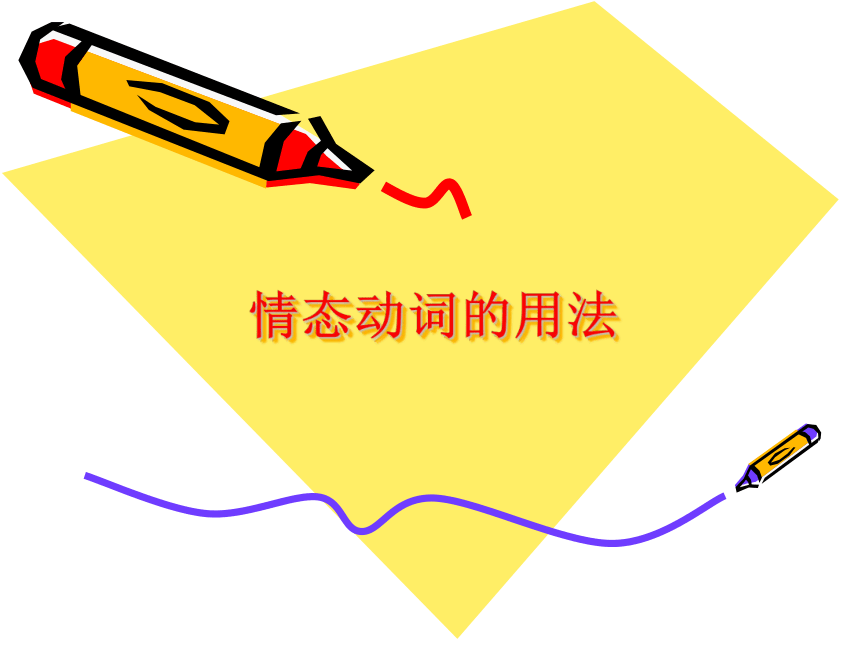
|
|
| 格式 | zip | ||
| 文件大小 | 21.5KB | ||
| 资源类型 | 教案 | ||
| 版本资源 | 重庆大学版 | ||
| 科目 | 英语 | ||
| 更新时间 | 2015-09-29 00:00:00 | ||
图片预览

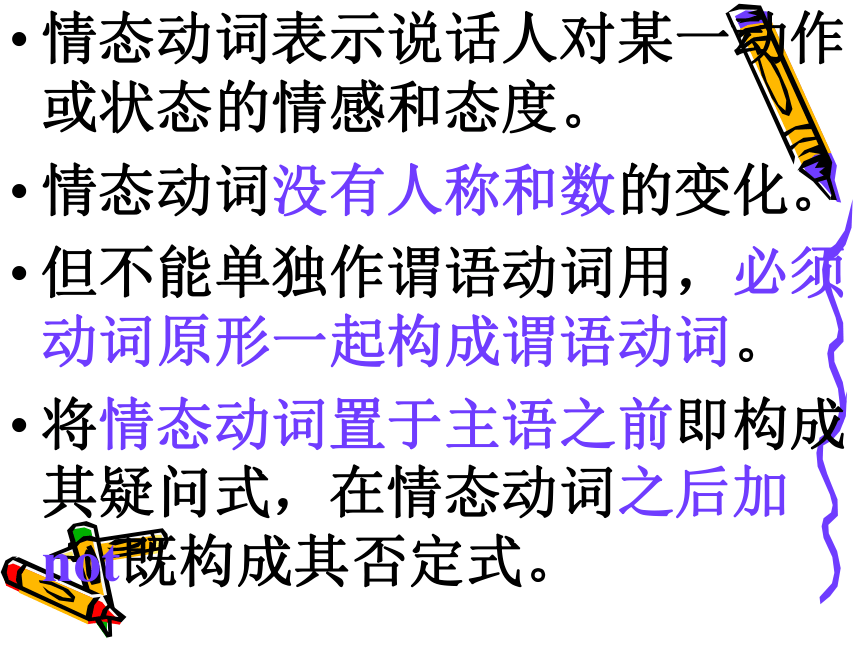
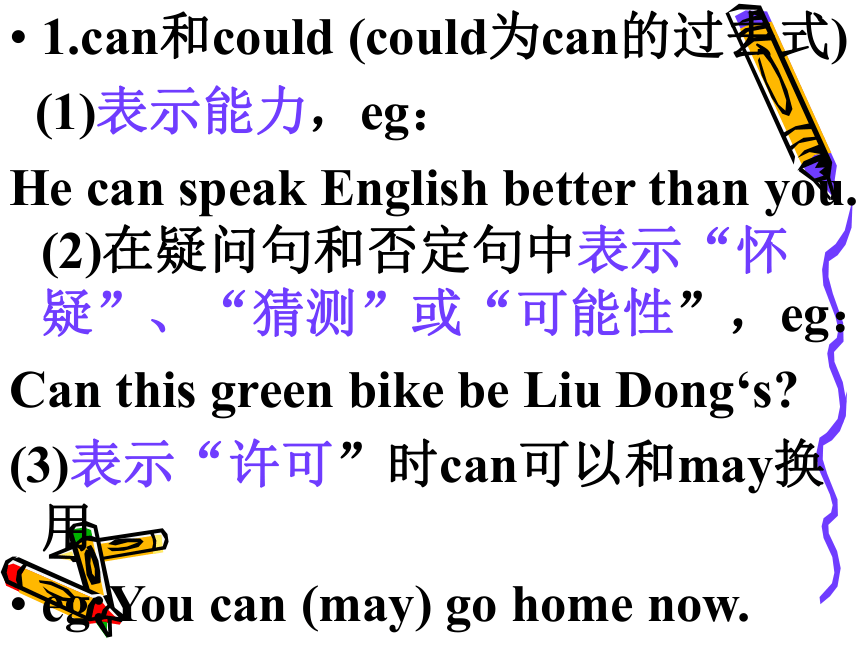
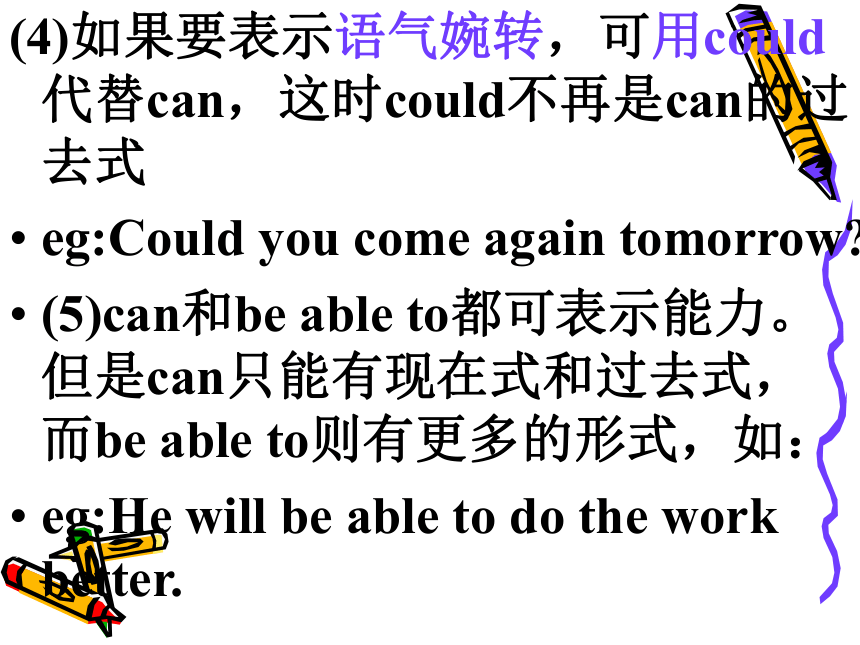
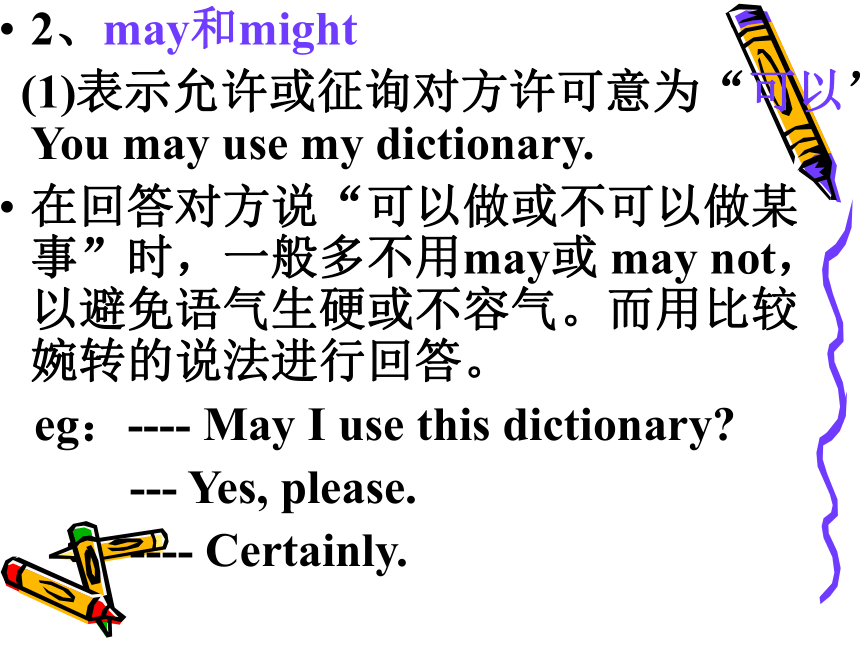
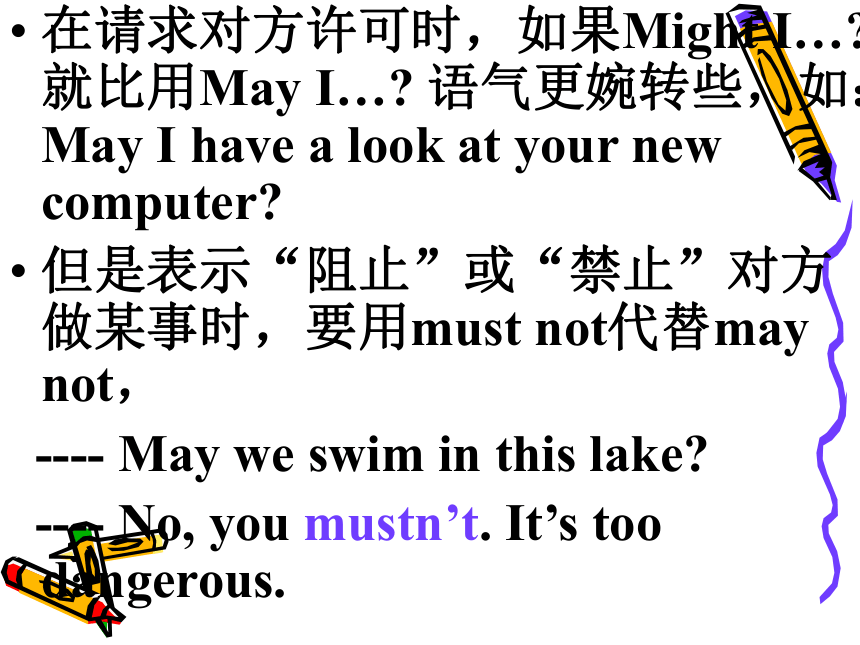
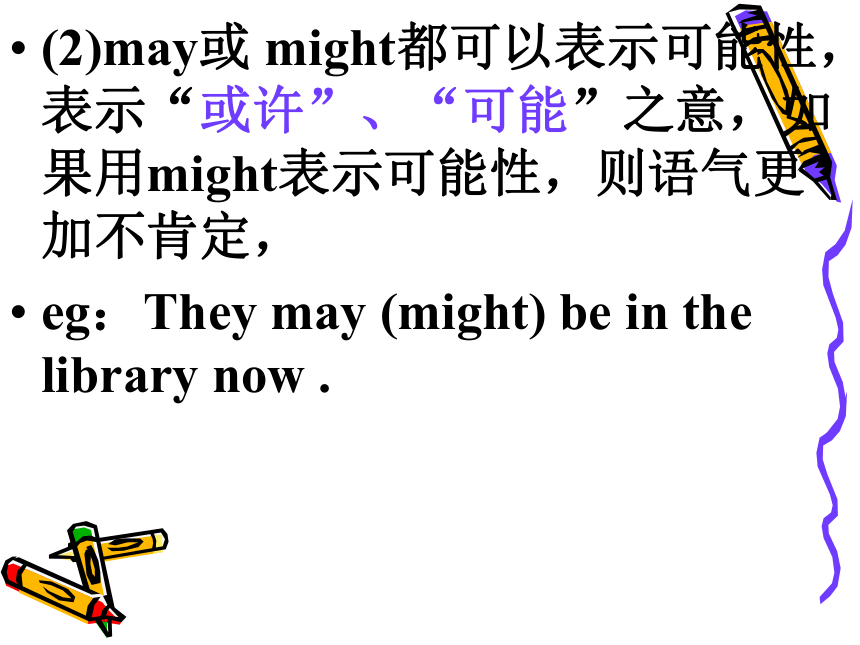
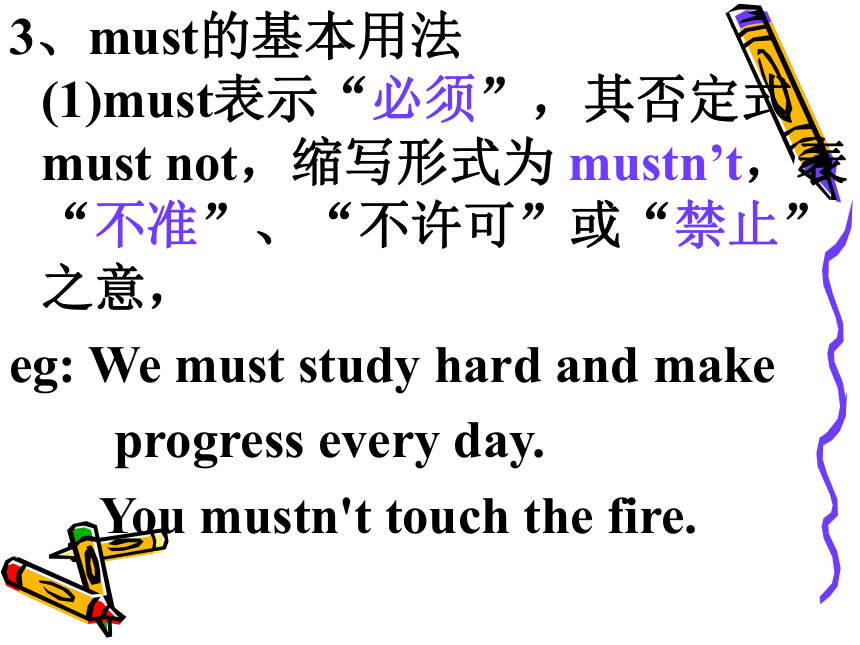
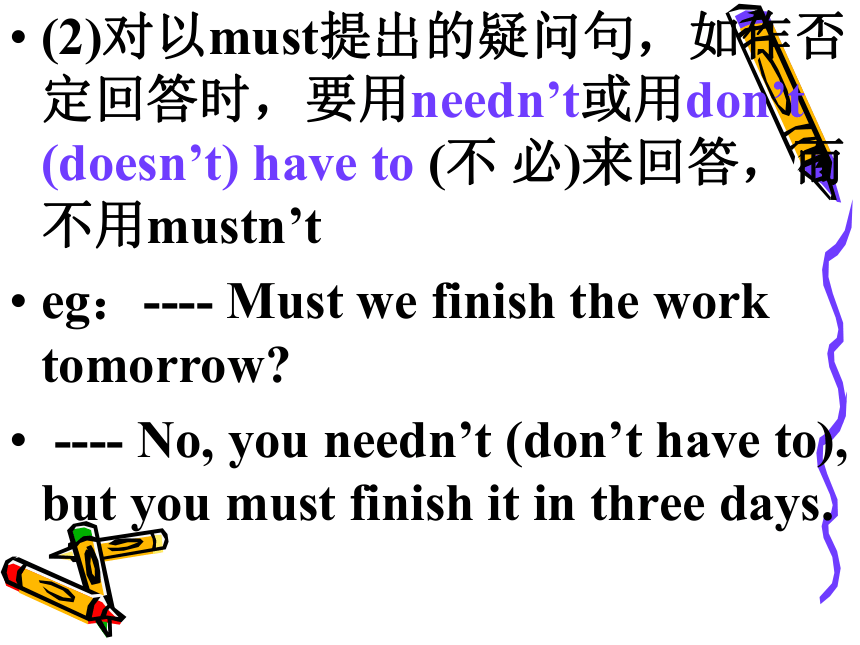
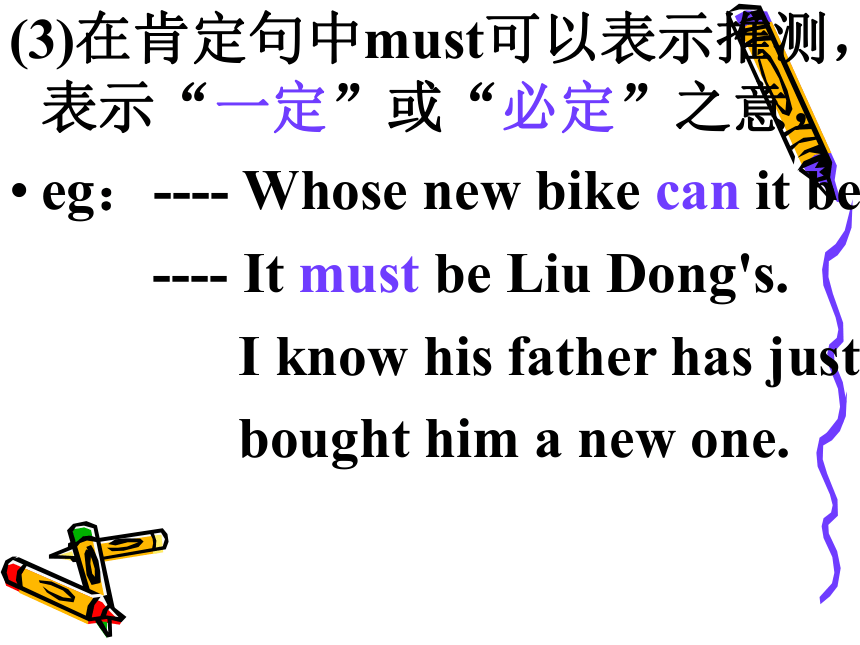
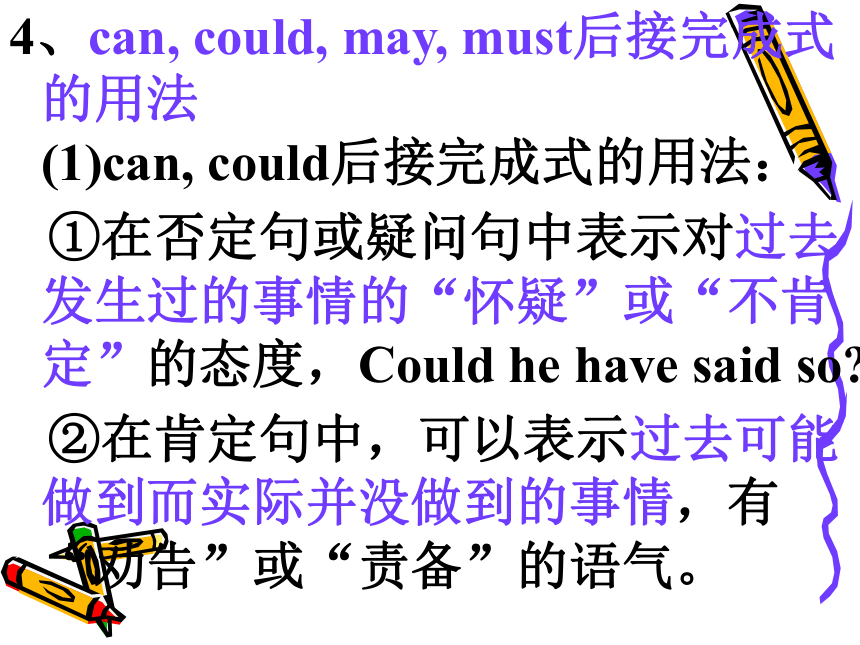
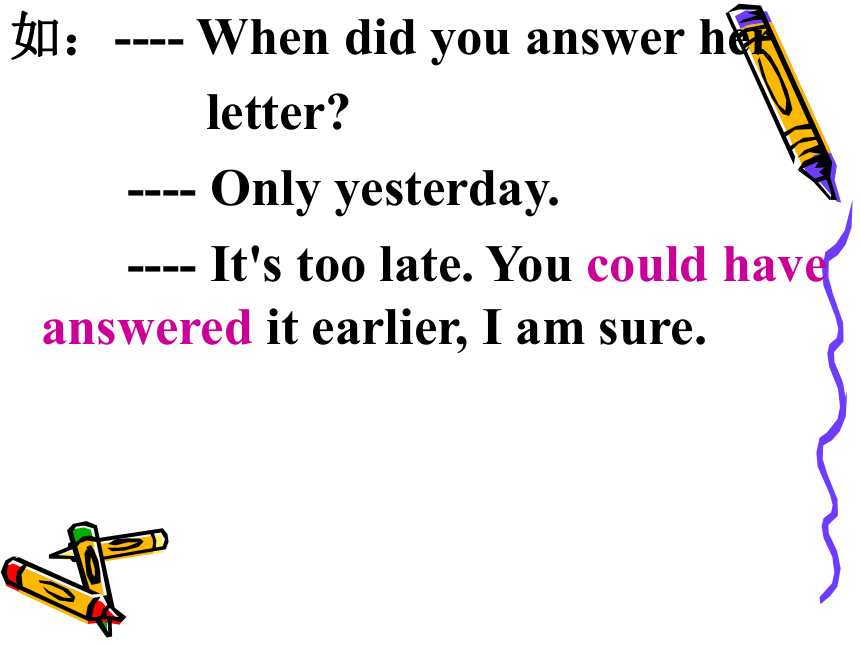
文档简介
课件33张PPT。情态动词的用法 情态动词表示说话人对某一动作或状态的情感和态度。
情态动词没有人称和数的变化。
但不能单独作谓语动词用,必须动词原形一起构成谓语动词。
将情态动词置于主语之前即构成其疑问式,在情态动词之后加not既构成其否定式。 1.can和could (could为can的过去式)
(1)表示能力,eg:
He can speak English better than you. (2)在疑问句和否定句中表示“怀疑”、“猜测”或“可能性”,eg:
Can this green bike be Liu Dong‘s?
(3)表示“许可”时can可以和may换用
eg:You can (may) go home now. (4)如果要表示语气婉转,可用could代替can,这时could不再是can的过去式
eg:Could you come again tomorrow?
(5)can和be able to都可表示能力。但是can只能有现在式和过去式,而be able to则有更多的形式,如:
eg:He will be able to do the work better. 2、may和might
(1)表示允许或征询对方许可意为“可以” You may use my dictionary.
在回答对方说“可以做或不可以做某事”时,一般多不用may或 may not,以避免语气生硬或不容气。而用比较婉转的说法进行回答。
eg:---- May I use this dictionary?
--- Yes, please.
---- Certainly. 在请求对方许可时,如果Might I…? 就比用May I…? 语气更婉转些,如:May I have a look at your new computer?
但是表示“阻止”或“禁止”对方做某事时,要用must not代替may not,
---- May we swim in this lake?
---- No, you mustn’t. It’s too dangerous. (2)may或 might都可以表示可能性,表示“或许”、“可能”之意,如果用might表示可能性,则语气更加不肯定,
eg:They may (might) be in the library now . 3、must的基本用法 (1)must表示“必须”,其否定式 must not,缩写形式为 mustn’t,表“不准”、“不许可”或“禁止”之意,
eg: We must study hard and make
progress every day.
You mustn't touch the fire. (2)对以must提出的疑问句,如作否定回答时,要用needn’t或用don’t (doesn’t) have to (不 必)来回答,而不用mustn’t
eg:---- Must we finish the work tomorrow?
---- No, you needn’t (don’t have to), but you must finish?it in three days. (3)在肯定句中must可以表示推测,表示“一定”或“必定”之意,
eg:---- Whose new bike can it be?
---- It must be Liu Dong's.
I know his father has just
bought him a new one. 4、can, could, may, must后接完成式的用法 (1)can, could后接完成式的用法:
①在否定句或疑问句中表示对过去发生过的事情的“怀疑”或“不肯定”的态度,Could he have said so?
②在肯定句中,可以表示过去可能做到而实际并没做到的事情,有“劝告”或“责备”的语气。如:---- When did you answer her
letter?
---- Only yesterday.
---- It's too late. You could have answered it earlier, I am sure. (2)may, might后接完成式的用法
①表示对过去某事的推测,认为某一件事情在过去可能发生了。
eg:Mary might have learned some Chinese before.
②可以表示过去本来可以做到而实 际没有做到的事情,有“劝告”或“责备”的语气eg:You didn't do the work well that day. You might have done it better.
(3)must后接完成式的用法:表示对过去某事的推测,认为某事在过去一定做到 了。
如:Liu Dong isn’t in the classroom. He must have gone to the library. 5、have to 的基本用法:意义相近,只是 must侧重表示说话人的主观看法,而have to 则表示客观需要,
eg:I must study hard.
I had to give it up because of illness.??????????????????????????????????????????????? 6、ought to的基本用法 (l)表示根据某种义务或必要“应当”做某事,语气比should强,
eg:Everyone ought to obey the traffic regulations. (2)表示推测,注意与must表示推测时的区别:
He must be home by now .(断定他已到家),
He ought to be home by now .(不十分肯定)
This is where the oil must be.(比较直率)
This is where the oil ought to be. (比较含蓄) ;
(3)“ought + have+ 过去分词”表示过去应做某事而 实际未做。
eg:You ought to have helped him. 这时,ought与 should可以互相换用。
注意,在美国英语中ought to 用于否定和疑问句时to可以省略。例如:Ought you smoke so much?
You oughtn’t smoke so much. 7、dare的基本用法 (l)dare (dared为其过去式) 作情态动词用时,主要用于否定句,疑问句和条件从句中。
eg:Dared he break the traffic rules
again?
(2)在现代英语中dare常用作行为动词,其变化与一般行为动词相同,
eg:She dares to stay at home alone at night. 8、need的基本用法 (1)need作情态动词用时,主要用于否定句和疑问句中,
eg:He needn't worry about us now.
(2)need也可作为行为动词用,可用于肯定句,否定句和疑问句中,其后可接名词、代词、动名词或带 to 的动词不定式为其宾语。eg:You need to practise reading aloud every day.
(3)needn‘t后接完成式可以表示过去做了一件本来不必要做的事情,
eg: ---- Did you answer the letter
yesterday?
---- Yes, I did.
---- But you needn’t have answered it. 9、shall的基本用法 (1)shall用作情态动词时,用于第二、三人称,表示说活人的意愿,可表示“命令”、“警告”、“强制”、“威胁”或“允诺”等意。
eg:He shall go first, whether he wants
to or not.
(2)在疑问句中,shall用于第一、三人称,表示说话人的征询对方意见或请求指示。
eg:Shall I open the door? 10、should的基本用法 (1)should作为情态动词可以表示“建议”或“劝告”,有“应该”之意,eg:You should learn from each other.
(2)should后接完成式表示过去没有做到本来应该做的事情,或是做了本来不应该做的事情。eg:You should have given him more help. 11、will的基本用法 (1)用于各种人称,可以表示“意志”或“决心”,eg:I have told him again and again to stop smoking, but he will not listen.
(2)在疑问句中用于第二人称,表示说话人向对方提出请求或询问对方的意愿
eg:Will you please tell me how to get to the Capital Gymnasium?(3)will可以表示一种习惯性的动作,有“总是”或“会要”之意,
eg:Every morning he will have a walk along this river.
12. would的基本用法 (1)would作为will的过去式,可用于各人称,表示过去时间的“意志”或“决心” 。eg:He promised he would never smoke again.
(2)在疑问句中,用于第二人称,表示说话人向对方提出请求或许可对方的意愿时,比用will的气更婉转
eg:Would you like some more coffee?
(3)在日常生活中,用“I would like to…”表示“我想要”或“我愿意”之意,以使语气婉转。
eg:I would like to do Ex.2 first.(4)would可以表示过去的习惯动作,比used to正式,并没有“现已无此习惯”的含义。如:
Last year our English teacher would sometimes tell us stories in English after class.
During the vacation he would visit me every week.
(5)表料想或猜想,如: It would be about ten when he left home.
What would she be doing there?
I thought he would have told you about it.
13. used to, had better, would rather (1)used to表示过去的习惯动作或状态,现在已不存在,在间接引语中,其形式可不变,例如:
He told us he used to play foot ball when he was young.
否定疑问句:
Usedn’t you to?Didn’t you use to be interested in the theatre?
强调句:I certainly used to/ did use to smoke, but it was a long time ago.
其反意疑问句或简略回答中,也有两种形式:
Used you to get up early in the morning? Yes, I did./ used to.
Did you use to play chess?
Yes, I did.
Used you to get up early in the morning? Yes, I did./ used to.
(2)had better意为“最好”,后接不带to的不定式。
eg: ---- We had better go now .
---- Yes, we had (we'd better/ we had better).
Hadn’t we better stop now?
Had we better not stop now?
I think I’d better be going. (用于进行时态,表“最好立即”)
You had better have done that (用于完成时态,表未完成动作) 注:had better用于同辈或小辈,对长辈不可用 (3)would rather意为“宁愿”。
I’d rather not say anything.
Would you rather work on a farm?
---- Wouldn’t you rather stay here?
---- No, I would not. I’d rather go there.
由于would rather表选择,因 而后可接than。
eg: I would rather work on a farm than in a factory.
I would rather watch TV than go to see the film.
I would rather lose a dozen cherry trees than that you should tell me one lie.
情态动词没有人称和数的变化。
但不能单独作谓语动词用,必须动词原形一起构成谓语动词。
将情态动词置于主语之前即构成其疑问式,在情态动词之后加not既构成其否定式。 1.can和could (could为can的过去式)
(1)表示能力,eg:
He can speak English better than you. (2)在疑问句和否定句中表示“怀疑”、“猜测”或“可能性”,eg:
Can this green bike be Liu Dong‘s?
(3)表示“许可”时can可以和may换用
eg:You can (may) go home now. (4)如果要表示语气婉转,可用could代替can,这时could不再是can的过去式
eg:Could you come again tomorrow?
(5)can和be able to都可表示能力。但是can只能有现在式和过去式,而be able to则有更多的形式,如:
eg:He will be able to do the work better. 2、may和might
(1)表示允许或征询对方许可意为“可以” You may use my dictionary.
在回答对方说“可以做或不可以做某事”时,一般多不用may或 may not,以避免语气生硬或不容气。而用比较婉转的说法进行回答。
eg:---- May I use this dictionary?
--- Yes, please.
---- Certainly. 在请求对方许可时,如果Might I…? 就比用May I…? 语气更婉转些,如:May I have a look at your new computer?
但是表示“阻止”或“禁止”对方做某事时,要用must not代替may not,
---- May we swim in this lake?
---- No, you mustn’t. It’s too dangerous. (2)may或 might都可以表示可能性,表示“或许”、“可能”之意,如果用might表示可能性,则语气更加不肯定,
eg:They may (might) be in the library now . 3、must的基本用法 (1)must表示“必须”,其否定式 must not,缩写形式为 mustn’t,表“不准”、“不许可”或“禁止”之意,
eg: We must study hard and make
progress every day.
You mustn't touch the fire. (2)对以must提出的疑问句,如作否定回答时,要用needn’t或用don’t (doesn’t) have to (不 必)来回答,而不用mustn’t
eg:---- Must we finish the work tomorrow?
---- No, you needn’t (don’t have to), but you must finish?it in three days. (3)在肯定句中must可以表示推测,表示“一定”或“必定”之意,
eg:---- Whose new bike can it be?
---- It must be Liu Dong's.
I know his father has just
bought him a new one. 4、can, could, may, must后接完成式的用法 (1)can, could后接完成式的用法:
①在否定句或疑问句中表示对过去发生过的事情的“怀疑”或“不肯定”的态度,Could he have said so?
②在肯定句中,可以表示过去可能做到而实际并没做到的事情,有“劝告”或“责备”的语气。如:---- When did you answer her
letter?
---- Only yesterday.
---- It's too late. You could have answered it earlier, I am sure. (2)may, might后接完成式的用法
①表示对过去某事的推测,认为某一件事情在过去可能发生了。
eg:Mary might have learned some Chinese before.
②可以表示过去本来可以做到而实 际没有做到的事情,有“劝告”或“责备”的语气eg:You didn't do the work well that day. You might have done it better.
(3)must后接完成式的用法:表示对过去某事的推测,认为某事在过去一定做到 了。
如:Liu Dong isn’t in the classroom. He must have gone to the library. 5、have to 的基本用法:意义相近,只是 must侧重表示说话人的主观看法,而have to 则表示客观需要,
eg:I must study hard.
I had to give it up because of illness.??????????????????????????????????????????????? 6、ought to的基本用法 (l)表示根据某种义务或必要“应当”做某事,语气比should强,
eg:Everyone ought to obey the traffic regulations. (2)表示推测,注意与must表示推测时的区别:
He must be home by now .(断定他已到家),
He ought to be home by now .(不十分肯定)
This is where the oil must be.(比较直率)
This is where the oil ought to be. (比较含蓄) ;
(3)“ought + have+ 过去分词”表示过去应做某事而 实际未做。
eg:You ought to have helped him. 这时,ought与 should可以互相换用。
注意,在美国英语中ought to 用于否定和疑问句时to可以省略。例如:Ought you smoke so much?
You oughtn’t smoke so much. 7、dare的基本用法 (l)dare (dared为其过去式) 作情态动词用时,主要用于否定句,疑问句和条件从句中。
eg:Dared he break the traffic rules
again?
(2)在现代英语中dare常用作行为动词,其变化与一般行为动词相同,
eg:She dares to stay at home alone at night. 8、need的基本用法 (1)need作情态动词用时,主要用于否定句和疑问句中,
eg:He needn't worry about us now.
(2)need也可作为行为动词用,可用于肯定句,否定句和疑问句中,其后可接名词、代词、动名词或带 to 的动词不定式为其宾语。eg:You need to practise reading aloud every day.
(3)needn‘t后接完成式可以表示过去做了一件本来不必要做的事情,
eg: ---- Did you answer the letter
yesterday?
---- Yes, I did.
---- But you needn’t have answered it. 9、shall的基本用法 (1)shall用作情态动词时,用于第二、三人称,表示说活人的意愿,可表示“命令”、“警告”、“强制”、“威胁”或“允诺”等意。
eg:He shall go first, whether he wants
to or not.
(2)在疑问句中,shall用于第一、三人称,表示说话人的征询对方意见或请求指示。
eg:Shall I open the door? 10、should的基本用法 (1)should作为情态动词可以表示“建议”或“劝告”,有“应该”之意,eg:You should learn from each other.
(2)should后接完成式表示过去没有做到本来应该做的事情,或是做了本来不应该做的事情。eg:You should have given him more help. 11、will的基本用法 (1)用于各种人称,可以表示“意志”或“决心”,eg:I have told him again and again to stop smoking, but he will not listen.
(2)在疑问句中用于第二人称,表示说话人向对方提出请求或询问对方的意愿
eg:Will you please tell me how to get to the Capital Gymnasium?(3)will可以表示一种习惯性的动作,有“总是”或“会要”之意,
eg:Every morning he will have a walk along this river.
12. would的基本用法 (1)would作为will的过去式,可用于各人称,表示过去时间的“意志”或“决心” 。eg:He promised he would never smoke again.
(2)在疑问句中,用于第二人称,表示说话人向对方提出请求或许可对方的意愿时,比用will的气更婉转
eg:Would you like some more coffee?
(3)在日常生活中,用“I would like to…”表示“我想要”或“我愿意”之意,以使语气婉转。
eg:I would like to do Ex.2 first.(4)would可以表示过去的习惯动作,比used to正式,并没有“现已无此习惯”的含义。如:
Last year our English teacher would sometimes tell us stories in English after class.
During the vacation he would visit me every week.
(5)表料想或猜想,如: It would be about ten when he left home.
What would she be doing there?
I thought he would have told you about it.
13. used to, had better, would rather (1)used to表示过去的习惯动作或状态,现在已不存在,在间接引语中,其形式可不变,例如:
He told us he used to play foot ball when he was young.
否定疑问句:
Usedn’t you to?Didn’t you use to be interested in the theatre?
强调句:I certainly used to/ did use to smoke, but it was a long time ago.
其反意疑问句或简略回答中,也有两种形式:
Used you to get up early in the morning? Yes, I did./ used to.
Did you use to play chess?
Yes, I did.
Used you to get up early in the morning? Yes, I did./ used to.
(2)had better意为“最好”,后接不带to的不定式。
eg: ---- We had better go now .
---- Yes, we had (we'd better/ we had better).
Hadn’t we better stop now?
Had we better not stop now?
I think I’d better be going. (用于进行时态,表“最好立即”)
You had better have done that (用于完成时态,表未完成动作) 注:had better用于同辈或小辈,对长辈不可用 (3)would rather意为“宁愿”。
I’d rather not say anything.
Would you rather work on a farm?
---- Wouldn’t you rather stay here?
---- No, I would not. I’d rather go there.
由于would rather表选择,因 而后可接than。
eg: I would rather work on a farm than in a factory.
I would rather watch TV than go to see the film.
I would rather lose a dozen cherry trees than that you should tell me one lie.
同课章节目录
- 3
- Unit 1 Friends and Friendship
- Unit 2 Between Parents and Us
- Unit 3 Motherly Love
- Unit 4 Dreams
- Unit 5 Wishes and Ambitions
- Unit 6 Perseverance
- Unit 7 Art
- Unit 8 Drama
- Unit 9 Poetry
- 4
- Unit 1 Project Hope
- Unit 2 Three Gorges
- Unit 3 Countries and Regions
- Unit 4 Plants
- Unit 5 Animals
- Unit 6 Man and Pets
- Unit 7 Neighborhood
- Unit 8 Workplace
- Unit 9 Living Today
